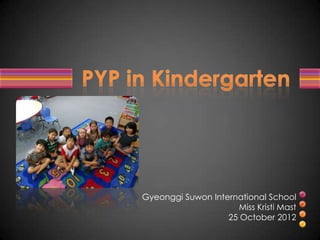
PYP in Kindergarten
- 1. Gyeonggi Suwon International School Miss Kristi Mast 25 October 2012
- 2. • by asking questions and wondering about things. • by doing things in a variety of ways. • by experimenting and playing. • by making connections between what we know and what we are learning. • collaboratively. • how to have international-mindedness. • through an inquiry-based approach. • through class discussions.
- 3. Our learning is challenging, engaging, relevant, and significant.
- 4. • It is the core of our learning. • It promotes international – mindedness. • Written Curriculum • What do we want to learn? • Taught Curriculum • How best might we learn? • Assessed Curriculum • How will we know what we have learned? • Action • Attitudes • Concepts • Knowledge • Skills
- 5. having just enough learning, Balanced 균형 play, and rest time Caring 돌봄 helping others because we love them Communicators 전달자 expressing yourself in many ways asking questions because you Inquirers 탐구자 want to learn more Knowledgeable 지식적인 being smart about something wanting to know more about Open – Minded 이해심이 깊은 different people and things Principled 원칙적인 knowing and doing your best thinking about yourself Reflective 깊이 생각하는 and what you have done Risk – Takers 모험적인 자 trying something new Thinkers 생각하는 자 thinking about what you do and say
- 6. Action What the students ACQUIRE. Attitudes Appreciation, Commitment, Confidence, Cooperation, Creativity, Curiosity, What the students GATHER. Empathy, Enthusiasm, Independence, Integrity, Respect, Tolerance Concepts What the students DO. Causation, Change, Connection, Form, Function, Perspective, Reflection, Responsibility What the students DEMONSTRATE. Knowledge Skills What the students LEARN. Communication, Research, Self – Management, Social, Thinking
- 7. Tuning In •What do we know? •What do we want to learn? Taking Action Finding Out •How can we apply •How can we learn? what we have •Where can we learned? learn? Inquiry Cycle Reflection •How do we feel Sorting Out about what we’ve •Have our questions learned? been answered? •How does this •What else do we relate to our want to know? previous and future learning? Going Further •How can we organize and share what we’ve learned?
- 8. Transdisciplinary Where We Are In Place & Time Theme Central Idea We are citizens of the world. • sharing personal journeys Lines of Inquiry • developing international-mindedness • creating a better world • causation – How can the Attitudes & Learner Profile help us develop international-mindedness? • perspective - How does sharing our personal journeys help us see that Concepts we are meaningful citizens of the world? • reflection - How will exhibiting the Attitudes and Learner Profile help create a better world? Language Arts, Music, Social Studies, & PSPE (Personal, Social, & Subject Focus Physical Education)
- 9. Transdisciplinary How We Express Ourselves Theme Central Idea Patterns can be discovered, created, & expressed. • what makes a pattern Lines of Inquiry • where patterns are found • how patterns are created & expressed • connection – Where are patterns found? Concepts • form – What makes a pattern? • function – How are patterns created & expressed? Language Arts, Mathematics, Music, & Subject Focus PSPE (Personal, Social, & Physical Education)
- 10. Transdisciplinary Who We Are Theme Central Idea There are many kinds of families in the world. • the family unit Lines of Inquiry • the roles & responsibilities of family members • the similarities & differences of families around the world • connection – How are families around the world either similar or different to our families? Concepts • form – What makes a family? • responsibility – What unique roles & responsibilities do family members have? Language Arts, Social Studies, & Subject Focus PSPE (Personal, Social, & Physical Education)
- 11. Transdisciplinary How We Organize Ourselves Theme Communities provide services designed to meet Central Idea people’s needs. • reasons people live in a local community Lines of Inquiry • services needed to support a community • planning services for a community • causation – In what ways can people get involved in their community? Concepts • connection – What services are found in a community? • function – Why do people live in a community? Language Arts, Social Studies, & Subject Focus PSPE (Personal, Social, & Physical Education)
- 12. Transdisciplinary Sharing The Planet Theme Central Idea People and plants share the planet. • characteristics of plants Lines of Inquiry • uses of plants • caring for plants • connection – How can we use plants? Concepts • form – What are the parts of a plant? How do plants grow? • responsibility – How can we take care of plants? Language Arts, Mathematics, Science, & Subject Focus PSPE (Personal, Social, & Physical Education)
- 13. Transdisciplinary How The World Works Theme Central Idea The characteristics of matter determine their use. • characteristics of matter Lines of Inquiry • changing matter • uses of matter • change – How can we change the states of matter? Concepts • form – What are the characteristics of the states of matters? • function – What are the uses of matter? Language Arts, Science, & Subject Focus PSPE (Personal, Social, & Physical Education)
- 14. ALL OF THESE WAYS ask your child about what they’re learning at school make note of any Learner Profile Attitudes or Attributes that your child is demonstrating at home visit our Kindergarten blog for updates & to view pictures and videos visit our Kindergarten classroom to see the students “in action”